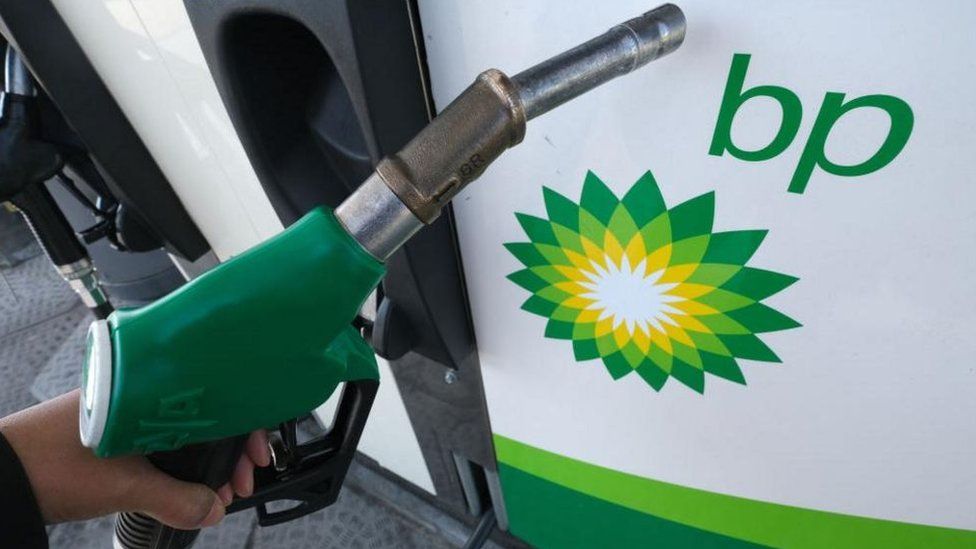
Oil giant BP has reported its highest profit for eight years, prompting calls for a windfall tax on energy companies.
BP posted a profit of $12.8bn (£9.5bn) for 2021, and it made more than $4bn in the final quarter of the year when oil and gas prices surged.
The jump in energy prices means households are facing huge increases in gas and electricity bills from April.
Labour said it was "only fair and right" that energy firms making higher profits should pay more tax.
Last week, rival oil giant Shell also reported bumper profits of $19bn on the same day that the energy regulator announced UK householders would see a 54% rise in their domestic energy bills in April.
Commentators say energy firms are raking in excess revenues on the back of fuel poverty and "creeping climate apocalypse".
However, firms like BP argue they are facing an unprecedented challenge: while the global economy remains heavily dependent on fossil fuels, they are being urged to shift to lower carbon alternatives, and need to big profits to fund that transition.
There is much debate over whether the energy industry can be relied on to pursue a renewables revolution quickly enough, and whether imposing higher taxes would slow down that change or provide the incentives to accelerate it.
Announcing the latest results, chief executive Bernard Looney said: "2021 shows BP doing what we said we would - performing while transforming."
He said the company was delivering for shareholders with $4.15bn of share buybacks and an increased dividend. BP had also made "strong progress" in its transformation towards becoming a low carbon energy business, he said.
Last year's bumper profits follow a $5.6bn loss BP reported in 2020, when economies around the world were shut down due to the Covid pandemic.
But rising demand for oil last year, as economies reopened, combined with supply chain challenges, pushed energy prices sharply higher by the end of 2021. The surge in revenues prompted Mr Looney to describe BP as "a cash machine".
UK households are facing a cost of living crisis, with prices for food and heating rising sharply. Last week's announcement of a huge increase in the energy price cap prompted the government to step in with a council tax rebate and loans to smooth price rises.
Labour and the Liberal Democrats have both called for a windfall tax on the profits of fossil fuel firms such as BP and Shell to fund more support for households.
"The boss of BP described the energy price crisis as a cash machine for his company - and the people supplying the cash are the British people through rocketing energy bills," said Ed Miliband, Labour's shadow secretary of state for climate and net zero.
"In these circumstances, it is only fair and right for oil and gas producers to contribute to helping the millions of families facing soaring inflation and a cost of living crisis."


The very same energy prices that have spelt crippling bills for consumers have prompted BP's boss to describe his operation right now as a "cash machine". A combination of resurgent demand and geopolitical tensions means wholesale gas prices are five times higher than before the pandemic - while oil prices have almost doubled.
And analysts think BP and Shell could make almost £40bn in profits this year, enough to cover the energy bills of the majority of UK households. The chancellor is not convinced of the need for a windfall tax, fearing that it could damage investment in lower carbon forms of energy.
BP's plans to invest in renewables are among the most ambitious in the sector, with an aim to increase spending on low carbon technologies 10-fold, to almost a third of its budget in 10 years.
But critics say that they could go further and that there could still be scope, given the scale of these profits,to help foot the bill for struggling customers

Under a plan outlined by Labour last month, North Sea energy producers would pay higher corporation tax for a year to fund £1.2bn of help for households.
Liberal Democrat Leader Ed Davey said: "It simply cannot be right these energy companies are making super profits whilst people are too scared to turn their radiators on and terrified there will be a cold snap.
"A windfall tax is the best way to get money to the people who need it quickly, but also to make sure there is some sense of trust and proportionality in the system."
Critics of a windfall tax argue it would discourage investment in North Sea production at a time when the UK is still heavily dependent on fossil fuels for transport and industry, as well as for heat and electricity generation.
Only a fraction of BP's profits are generated in the North Sea, however, so a windfall tax applied only to those operations would raise limited revenue, while applying an additional tax to the firm's global profits might be more difficult to execute.
Former BP executive Nick Butler said what mattered most was how the oil giants were choosing to use bumper profits.
"What society needs now is both the transition to low carbon and energy security," he told the BBC's Today programme.
"We need to invest in oil and gas because 80% of all the energy we use every day is oil and gas, and we need companies like BP and Shell investing in that supply to ensure volatility of the world market is mitigated."
BP has moved more quickly than many of its rivals to embrace the transition to renewable energy, he added.
Allegra Dawes, senior analyst at Third Bridge, said BP had embarked on an "aggressive strategy" including plans to cut oil and gas production by 40% by 2030, but it remained to be seen whether they could generate returns from low carbon business areas.
https://news.google.com/__i/rss/rd/articles/CBMiLGh0dHBzOi8vd3d3LmJiYy5jby51ay9uZXdzL2J1c2luZXNzLTYwMjk5ODg20gEA?oc=5
2022-02-08 11:02:54Z
1289038292
Tidak ada komentar:
Posting Komentar